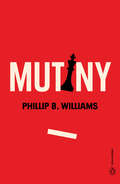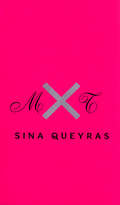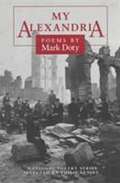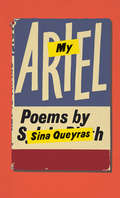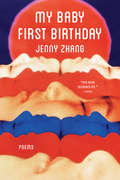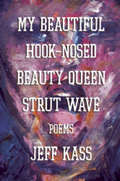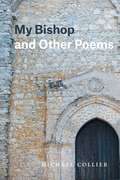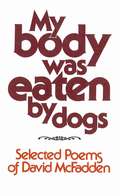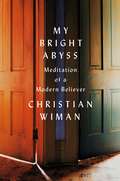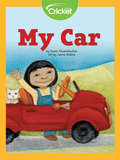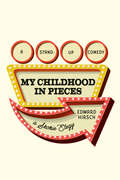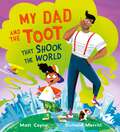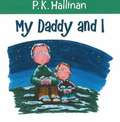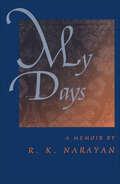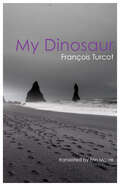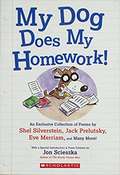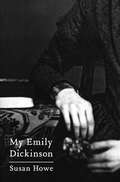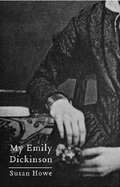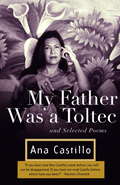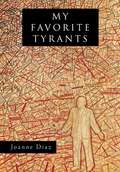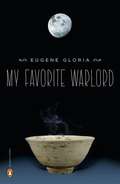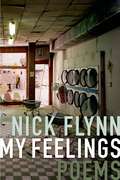- Table View
- List View
Mutiny (Penguin Poets)
by Phillip B. WilliamsFrom the critically acclaimed author of Thief in the Interior who writes with "a lucid, unmitigated humanity" (Boston Review), a startling new collection about revolt and renewalMutiny: a rebellion, a subversion, an onslaught. In poems that rebuke classical mythos and western canonical figures, and embrace Afro-Diasporanfolk and spiritual imagery, Phillip B. Williams conjures the hell of being erased, exploited, and ill-imagined and then, through a force and generosity of vision, propels himself into life, selfhood, and a path forward. Intimate, bold, and sonically mesmerizing, Mutiny addresses loneliness, desire, doubt, memory, and the borderline between beauty and tragedy. With a ferocity that belies the tenderness and vulnerability at the heart of this remarkable collection, Williams honors the transformative power of anger, and the clarity that comes from allowing that anger to burn clean.
MxT
by Sina QueyrasMxT, or 'Memory x Time,' is one of the formulas acclaimed poet Sina Queyras posits as a way to measure grief. These poems mourn the dead by turning memories over and over like an old coin, by invoking other poets, by appropriating the language of technology, of instruction, of diagram, of electrical engineering, and of elegy itself. Devastating, cheeky, allusive, hallucinatory: this is Queyras at her most powerful.
My Alexandria: Poems
by Mark DotyIn the search for his Alexandria, the holy city of the imagination where he might find love, transcendence, and beauty, the poet has gone into the actual cities of the world where he has found us, the unloved, the dying, the survivors, among the wreckage of our lives.
My Ariel
by Sina Queyras Sina QueyrasWhere were you when you first read Ariel? Who were you? What has changed in your life? In the lives of women? In My Ariel, Sina Queyras barges into one of the iconic texts of the twentieth century, with her own family baggage in tow, exploring and exploding the cultural norms, forms, and procedures that frame and contain the lives of women.
My Baby
by Carly Jayne RoachMy Baby is a heartwarming book that promotes early bonding between mother and baby, written by an author who gave birth during the COVID pandemic. With sweet and simple rhymes, the author conveys the love, kisses, and cuddles shared between mother and baby, as they embark on their journey of growth together. This book is a must-have for new mums, as it provides a beautiful and intimate way to connect with their babies during those early stages of life. With stunning illustrations that capture the tender moments between mother and child, readers will feel a deep sense of oneness with their little one. Whether you’re a new mum, or searching for the perfect baby shower gift, My Baby is a touching and meaningful addition to any family’s bookshelf. It’s a reminder that the love between a mother and baby is powerful and enduring, and something to be cherished for a lifetime.
My Baby First Birthday
by Jenny ZhangRadiant and tender, My Baby First Birthday is a collection that examines innocence, asking us who gets to be loved and who has to deplete themselves just to survive. Jenny Zhang writes about accepting pain, about the way we fetishize womanhood and motherhood, and reduce women to their violations, traumas, and body parts. She questions the way we feminize and racialize nurturing, and live in service of other people’s dreams. How we idealize birth and being baby, how it’s only in our mothers’ wombs that we’re still considered innocent, blameless, and undamaged, because it’s only then that we don’t have to earn love. Her poems explore the obscenity of patriarchy, whiteness, and capitalism, the violence of rescue and heroism. The magic trick in My Baby First Birthday is that despite all these themes, the book never feels like some jeremiad. Zhang uses friendship as a lyric. She seeks tenderness, radiant beauty, and having love for your mistakes. Through all this, she writes about being alone—really alone, like why-was-I-ever-born alone—and trying, despite everything, to reach out and touch something—skin to skin, animal to animal.
My Beautiful Hook-Nosed Beauty Queen Strut Wave
by Jeff KassIt's hard to be a teacher. Hard to be a father. Harder still to be a husband. So what can you do? How do you survive? You look for joy everywhere you can. You write poems about these moments to keep them alive in your breast. These poems represent hope for a better tomorrow.
My Bishop and Other Poems (Phoenix Poets)
by Michael CollierThink of a time when you’ve feigned courage to make a friend, feigned forgiveness to keep one, or feigned indifference to simply stay out of it. What does it mean for our intimacies to fail us when we need them most? The poems of this collection explore such everyday dualities—how the human need for attachment is as much a source of pain as of vitality and how our longing for transcendence often leads to sinister complicities. The title poem tells the conflicted and devastating story of the poet’s friendship with the now-disgraced Bishop of Phoenix, Arizona, interweaving fragments of his parents’ funerals, which the Bishop concelebrated, with memories of his childhood spiritual leanings and how they were disrupted by a pedophilic priest the Bishop failed to protect him from. This meditation on spiritual life, physical death, and betrayal is joined by an array of poised, short lyrics and expansive prose poems exploring how the terror and unpredictability of our era intrudes on our most intimate moments. Whether Michael Collier is writing about an airline disaster, Huey Newton’s trial, Thomas Jefferson’s bees, a piano in the woods, or his own fraught friendship with the disgraced Catholic Bishop, his syntactic verve, scrupulously observed detail, and flawless ear bring the felt—and sometimes frightening—dimensions of the mundane to life. Throughout, this collection pursues a quiet but ferocious need to get to the bottom of things.
My Bright Abyss: Meditation Of A Modern Believer
by Christian WimanSeven years ago, Christian Wiman, a well-known poet and the editor of Poetry magazine, wrote a now-famous essay about having faith in the face of death. My Bright Abyss, composed in the difficult years since and completed in the wake of a bone marrow transplant, is a moving meditation on what a viable contemporary faith—responsive not only to modern thought and science but also to religious tradition—might look like. Joyful, sorrowful, and beautifully written, My Bright Abyss is destined to become a spiritual classic, useful not only to believers but to anyone whose experience of life and art seems at times to overbrim its boundaries. How do we answer this “burn of being”? Wiman asks. What might it mean for our lives—and for our deaths—if we acknowledge the “insistent, persistent ghost” that some of us call God? One of Publishers Weekly's Best Religion Books of 2013.
My Car
by Karen KlozenbucherClimb in my car, Quick, quick, quick. Turn the key, Click, click, click.
My Cat Likes to Hide in Boxes
by Eve SuttonThe cat from France likes to sing and dance. The cat from Norway got stuck in the doorway. But MY cat likes to hide in boxes.
My Childhood in Pieces: A Stand-Up Comedy, a Skokie Elegy
by Edward HirschFrom the award-winning poet, dark comic microbursts of prose deliver a whole childhood, at the hands of an aspiring middle-class Jewish family whose hard-boiled American values and wit were the forge of a poet's coming-of-age.&“My grandparents taught me to write my sins on paper and cast them into the water. . . . They didn&’t expect an entire book,&” Hirsch says in the &“prologue&” to this glorious festival of knife-sharp observations. In microchapters—sometimes only a single scathing sentence long—with titles like &“Call to Breakfast,&” &“Pay Cash,&” &“The Sorrow of Manly Sports,&” and &“Aristotle on Lawrence Avenue,&” Eddie&’s gambling father, Ruby, son of a white metal smelter, schools him and his sister in blackjack; Eddie&’s mom bangs pots to wake the kids to a breakfast of cold cereal; Uncle Bob, in the collection business, is heard threatening people on the phone; and nobody suffers fools. In this household, Eddie learned to jab with his left and cross with his right, never to kid a kidder, and how to sneak out at night. Affectionate, deadpan, and exuberant, steeped in Yiddishkeit and Midwestern practicality, Hirsch&’s laugh-and-cry performance animates a heartbreaking odyssey, from the cradle to the day he leaves home, armed with sorrow and a huge store of poetic wit.
My Dad and the Toot that Shook the World
by Matt CoyneThe perfect Father's Day gift for tooting dads everywhere! All aboard the Butt Force One! Travel the world and back again in this TOOT-ally hilarious rhyming romp following the most destructive fart to ever be farted! When Eddie's dad lets off a ground-shakingly shocking fart, they know it's about to take the world by stinky storm. And only they can stop it . . .Get ready for a toot-acular, rip-roaring, globe-spanning adventure to catch the powerful parp!Perfect for children (and adults) who love a little potty-humour! Written by - but not inspired by - Matt Coyne, bestselling author and creator of the Man vs. Baby blog, with EXPLOSIVE illustrations by Richard Merritt.Praise for Matt Coyne:'A hero for dads everywhere' Daily Mirror'Very, very funny' This Morning'Matt Coyne's post has struck a chord with parents from all over the world' Daily Mail'Brutally honest rant on the reality of parenthood has taken the internet by storm' Sunday Telegraph
My Daddy and I
by P. K. HallinanThis work is for ages 3-5. This is a story that perfectly illustrates the loyalty and love that grows between a father and his children. Whimsical illustrations bring the characters to life in this gentle world Hallinan has created.
My Days: A Memoir
by R. K. Narayan"I am inclined to call this the last chapter, but how can an autobiography have a final chapter? At best, it can only be a penultimate one; nor can it be given a rounded-off conclusion, as is possible in a work of fiction." So begins the last chapter of My Days, the only memoir from R. K. Narayan, hailed as "India's most notable novelist and short-story writer" by the New York Times Book Review.In his usual winning, humorous style, R. K. Narayan shares his life story, beginning in his grandmother's garden in Madras with his ferocious pet peacock. As a young boy with no interest in school, he trains grasshoppers, scouts, and generally takes part in life's excitements. Against the advice of all, especially his commanding headmaster father, the dreaming Narayan takes to writing fiction, and one of his pieces is accepted by Punch magazine (his "first prestige publication"). Soon his life includes bumbling British diplomats, curious movie moguls, evasive Indian officials, eccentric journalists, and "the blind urge" to fall in love. R. K. Narayan's larger-than-life perception of the human comedy is at once acute and forgiving, and always true to it.
My Dinosaur (Literature in Translation Series)
by Erín Moure François TurcotThe figure of the father occupies a particularly significant place in Qu�b�coise literature--there's a real fascination with fathers, and this recurring persona populates fiction, films, and the stories people tell of their families and themselves. Thus, it's not surprising that, as he witnessed his own father's frailty, Fran�ois Turcot--one of Quebec's most celebrated young literary voices--would write his own dedication to his vanished father, entitled My Dinosaur. In this, his first collection of poems to be published in English (and translated by renowned poet Er�n Moure), Turcot excavates, reconstructs, and pays tribute not just to the father, but also to the figure of the son, and to writing itself as key to story, emotion, memory, and history.The dinosaur of My Dinosaur is that of the distant father, sought in mourning, by the son. With luminous and lucid writing, Turcot excavates the fossil gaze of his father, in an elated elegy composed of poems both tensed and open, minimalist and talkative, serious and droll, alternating the voice and writings of the father with the fictions and assemblies of the son--reminding us that a man's story can only be told by assembling the shreds and bits that we've accumulated over the course of our lives. As prolonged metaphor for all disappearances and for the endurance of memory, Turcot's meticulous assembly in My Dinosaur is a tribute to all our Dads. Turcot's surprisingly light and wryly humorous poems will resonate deeply with readers who are inquisitive about the role of family and memory in the construction of identity and self. Scholars who are exploring literary work on grief, and anyone who has lost a parent and felt grief but also curiosity about their lives will connect with Turcot's reflections in My Dinosaur. And finally, fans of the poetics and translation practice of Er�n Moure will delight in this new work that has earned comparisons to Moure's own elegiac work in Kapusta (Anansi, 2015).
My Dog Does My Homework
by Shel Silverstein Jack Prelutsky Eve MerriamEnjoy the book by yourself, with a friend, or maybe--if you’re lucky enough to have one-- with the dog who does your homework.
My Emily Dickinson
by Eliot Weinberger Susan Howe"Starts off as a manifesto but becomes richer and more suggestive as it develops."--The New York Sun With exacting rigor and wit, Howe pulls Dickinson free of all the sterile and stuffy belle-of-Amherst cotton wool and shows the poet in touch with elemental forces of nature, and as a prophet in all her radical zealotry and poetic glory. Her Emily Dickinson is a unique American genius, a demon lover of poetry--no neurasthenic spider artist. Howe draws into her discussion Browning, Wuthering Heights, the Civil War, "Master," the great Puritan preachers, captivity narratives, Shakespeare, and phantom lovers. As she chases away narrow and reductive feminist readings of the poet, Howe finds instead a radically powerful and true feminism at work in Dickinson, focusing the whole on that heart-stopping poem "My Life had stood--a Loaded Gun." A remarkable and passionate poet-on-poet engagement, My Emily Dickinson frees a great poet from the fetters of being read as a special female neurotic, and sets her against a fiery open sky where "Perception of an object means loosing and losing it...only Mutability certain." My Emily Dickinson won The Before Columbus Foundation Book Award.
My Emily Dickinson
by Susan HoweMy Emily Dickinson won The Before Columbus Foundation Book Award. In this book, with exacting rigor and wit, Howe pulls Dickinson free of all the sterile and stuffy belle-of-Amherst cotton wool and shows the poet in touch with elemental forces of nature, and as a prophet in all her radical zealotry and poetic glory.
My Father Was a Toltec
by Ana CastilloMixing the lyrical with the colloquial, the tender with the tough, Ana Castillo has a deserved reputation as one of the country's most powerful and entrancing novelists, but she began her literary career as a poet of uncompromising commitment and passion. My Father Was a Toltec is the sassy and street-wise collection of poems that established and secured Castillo's place in the popular canon. It is included here in its entirety along with the best of her early poems. Ana Castillo's poetry speaks--in English and Spanish--to every reader who has felt the pangs of exile, the uninterrupted joy of love, and the deep despair of love lost.From the Trade Paperback edition.
My Favorite Book
by Good Will IncIn these short, nostalgic, easily understood poems compiled by Good Will Inc. children take pleasure in the simple elements in their lives including birds, grandmothers, gardening, sharing with friends, helping parents, getting up in the morning and going to bed at night. Preschoolers will enjoy having this poetry read to them again and again and will find themselves naturally memorizing their favorites. These poems remind children to pay attention to and be thankful for core values and experiences with family, nature, beauty and friends. Some pictures are described by the validator.]
My Favorite Tyrants
by Joanne Diaz"Winner of the 2014 Brittingham Prize in Poetry, selected by Naomi Shihab Nye" The word "tyrant" carries negative connotations, but in this new collection, Joanne Diaz tries to understand what makes tyranny so compelling, even seductive. These dynamic, funny, often poignant poems investigate the nature of tyranny in all of its forms-political, cultural, familial, and erotic. Poems about Stalin, Lenin, and Castro appear beside poems about deeply personal histories. The result is a powerful exploration of desire, grief, and loss in a world where private relationships are always illuminated and informed by larger, more despotic forces.
My Favorite Warlord
by Eugene GloriaA third collection from an award-winning poet whose "gift is breathtaking" (Naomi Shihab Nye) The themes of identity, relationships, and the poet's sense of origin are at the heart of Eugene Gloria's rich and captivating new collection. The title poem weaves together Japan's sixteenth-century warlord Hideyoshi with a meditation about the poet's father's dementia; "Here on Earth" embraces post-racial America and the speaker's own sense of displacement in the Midwest. In elegy and psalm, as well as ancient forms from Asia such as the haibun and pantoum, these elegant and passionate poems enact rage, civility, love, travel, and art as well as explore Gloria's own fears of frailty and erasure. .
My Feelings: Poems
by Nick FlynnA daring and intimate new book by the poet and memoirist Nick Flynn, "a champion of contemporary American poetry" (Newpages). . . the take from his bank jobs, all of itwill come to me, if I can just get him to draw mea map, if I can find the tree, if I can findthe shovel. And the house, the mansion hegrew up in, soon a lawyer will passa key across a walnut desk, but even thislawyer will not be able to tell me where thismansion is. —from "Kafka" In My Feelings, Nick Flynn makes no claims on anyone else's. These poems inhabit a continually shifting sense of selfhood, in the attempt to contain quicksilver realms of emotional energy—from grief and panic to gratitude and understanding.
